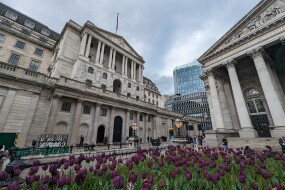The Bank of England (BoE) has voted to maintain interest rates at 5.25%. Despite inflation hitting the 2% target, the Monetary Policy Committee (MPC) voted 7-2 to keep rates at a 16-year high, citing the need to ensure sustained low inflation. However, a reduction as early as August was hinted at by
Bank Of England
The Bank of England (BoE) has come under scrutiny for having spent £8.5 million on remote working kit for staff, according to official figures. The data, obtained under the Freedom of Information (FOI) Act by think thank Parliament Street revealed that Threadneedle Street has splashed out on a
Banknotes carrying a portrait of King Charles III have been issued for the first time on 5 June 2024.
The Bank of England's Monetary Policy Committee (MPC) has voted to maintain the Bank Rate at 5.25% in May, but experts say signs of an impending rate cut are clear. The MPC's forecast predicts inflation below 2% in two to three years, signalling potential cuts.
The Bank of England has agreed to a “once in a generation” overhaul of its forecasting and communications strategies following a comprehensive review led by former Federal Reserve chair Ben Bernanke. The review provides a thorough assessment of the bank’s current forecasting approa
The Bank of England Governor, Andrew Bailey, has signalled that markets are correct to anticipate more than one interest rate cut this year, expressing growing confidence that inflation is heading towards the target. In an interview with the Financial Times, Governor Bailey stated that rate cuts wer
The Bank of England (BoE) has decided to keep interest rates unchanged at 5.25%, despite a drop in inflation to 3.4% in February – the lowest level since September 2021. The positive inflation figures, released on Wednesday, came ahead of the BoE's latest interest rate decision today.
The UK may have already emerged from recession, with signs of an upturn, according to the Governor of the Bank of England Andrew Bailey. In a recent appearance before a committee of MPs, Mr Bailey indicated the possibility of interest rate cuts even before inflation reaches the 2% target. The b
The Bank of England has decided to maintain interest rates at 5.25% for the fourth consecutive meeting, emphasising the need for "more evidence" that inflation is on a sustained downward trajectory before considering rate cuts. Andrew Bailey, Governor of the Bank of England, explained that they requ
The Bank of England (BoE) has again decided to maintain the base interest rate at 5.25%. This decision came amidst Governor Andrew Bailey's assertion that considerable effort is still needed to bring inflation down to the standard 2% target. The Monetary Policy Committee (MPC) voted six to three in
The House of Lords' Economic Affairs Committee has stated that reforms are needed to improve the Bank of England's performance and accountability to parliament.
The Bank of England (BoE) has voted to maintain the base interest rate at 5.25% for the second consecutive time, signalling a continued tight monetary stance into the foreseeable future against a backdrop of persistent inflation and subdued economic growth. Despite the grim economic outlook, the cen
August has witnessed a sustained surge in wages, one of the fastest since records began in 2001, according to the Office for National Statistics (ONS), sparking concerns over persistent inflation contrary to the Bank of England's expectations.
August saw an increase in net borrowing of mortgage debt by individuals, marking the fourth consecutive month of growth, with a significant rise to £1.2 billion, up from July's £0.2bn. In contrast, the UK observed a decline in net mortgage approvals for house purchases, dropping to a six
The Bank of England (BoE) has opted to maintain interest rates at 5.25% in a tightly contested vote. The decision follows almost two years of consecutive rate rises and is seen by experts as a potential peak, considering the better-than-expected inflation data received recently.











